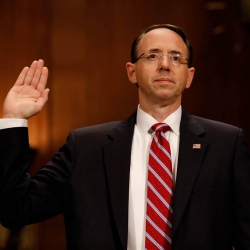Online gambling media members who rejoiced the recusal by Attorney General Jeff Sessions might temper their enthusiasm. Deputy Attorney General Rod Rosenstein, the man who now oversees online gambling policy at the U.S. Department of Justice., might be a more stolid opponent of iGaming.
Rod Rosenstein’s 12-year tenure as the U.S. Attorney for Maryland shows he is an opponent of online gambling. In one of his first acts as a US Attorney in 2005, Rosenstein targeted NETeller for payment processing of unregulated online gambling sites.
Rosenstein Versus NETeller
He charged NETeller with money laundering in the case, causing the global payment processor enough damage that it took years for the company to regain its prominence. At the time Rosenstein handed down his indictments, NETeller was used by over 80% of the online gaming sites on the Internet.
NETeller was only the beginning. From 2009 to 2011, Rosenstein took down several lesser payment processing companies. At first, his plan was to go after mortgage fraud. Eventually, he added money laundering through online gambling to the list of violations he wanted to pursue.
Rosenstein’s Blue Monday Indictments
That led to the “Blue Monday” indictments in 2011, in which 10 domains were seized. These included several popular poker sites, including DoylesRoom.com, TruePoker, Merge Gaming Network sites like BetEd, and BMX Entertainment sites like BookMaker.com. One prominent payment services were named in the Blue Monday case, too: UseMyWallet/QuickTender (owned by EcoCard) and Linwood Payment Services.
ThrillX Systems Ltd, owned by BetED sportsbook’s founders, Darren Wright and David Parchomchuk, were named in the indictments. Though the ThrillX domain was not seized, its owners took the site down. Several other gaming operators were named in the case, including Absolute Poker, Ultimate Bet, Cereus Network, Sabana Investments, Wray, Entwistle, and K23 Systems.
In short, Rod Rosenstein led one of the biggest takedowns of unregulated online gambling sites in American history. While the Black Friday indictments unsealed a month prior to the Blue Monday case got a lot more attention, Rod Rosenstein’s legal actions helped put a dampener on the US unregulated online poker industry.
Rosenstein Versus Bodog
The next year, Rosenstein indicted several Bodog executives and seized the Bodog domain name. It is no exaggeration to say Rod Rosenstein has been one of the foremost prosecutors of American online gambling operators of the past decade.
Rosenstein is quick to defend his actions, saying that these various activities are crimes in Maryland. He also notes that money laundering helps fund organized crime and terrorism, so he wants to punish those who support gambling when he can.
OSGA’s Report on Rosenstein’s Hostility
The Deputy Attorney General has never stated his opinion on legal, regulated online gambling before. Hartley Henderson of the Off Shore Gaming Association (OSGA) stated that he has spoke to officials who know Rod Rosenstein and they say he does not like online gambling in any form.
Rosenstein’s Handling of the Comey Firing
The Russian collusion investigation and the firing of James Comey showed another side to Rod Rosenstein: he is not shy about using his authority. On several occasions, former U.S. Senator Jeff Sessions has recused himself from various cases, showing that he is sensitive to political pressure. Rod Rosenstein reacts to situations like a career prosecutor and not a politician.
In the James Comey firing, Rosenstein was asked by President Donald Trump to write a summary of the FBI director’s shortcomings and mistakes. When Comey was fired, the White House first claimed the firing was done at the behest of Rod Rosenstein. The American media began to question Rosenstein’s longstanding reputation as a nonpolitical figure.
Rosenstein quickly restored his reputation, despite going against the express wishes of Donald Trump. Despite being on the job for less than three weeks, Rod Rosenstein used his authority as Deputy Attorney General to appoint former FBI Director Robert Mueller as “special counsel”, to investigate the Russian collusion charges and the Comey firing. He gave Mueller sweeping authority and resources to probe those questions. From subsequent tweets, it was clear Donald Trump was not happy with those decisions.
Rod Rosenstein Is a Decisive Prosecutor
Whatever one thinks of those decisions, it is obvious that Rod Rosenstein acts with decisiveness. He might prove to be a more unrelenting foe of online gambling in the United States than Jeff Sessions might have been. As US Attorney General, Jeff Sessions had the authority to overturn the 2011 Department of Justice opinion on the UIGEA. With Sessions recusing himself, Rod Rosenstein now has that same authority.
The 2011 DoJ opinion is the foundation of the legal online poker in New Jersey, Nevada, and Delaware. Nothing says Rod Rosenstein plans on changing the 2011 opinion, but he has a long history of opposing iGaming. Operators should be wary.

